Students
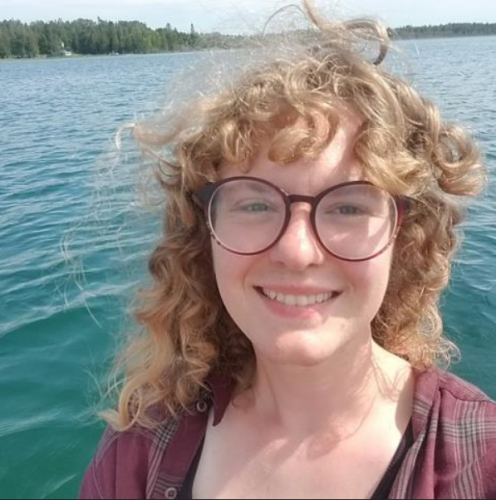
Ashley Hamersma
Ph.D. Student
Department of Biology
Florida Museum of Natural History
Advisor: Dr. Steven R. Manchester
Email: ahamersma”@”ufl.edu
I received my BS in Earth & Environmental Sciences and a minor in Ecology and Evolutionary Biology from the University of Michigan, and worked with CT data to describe fruits and seeds from the Miocene of Panama. In Dr. Steven Manchester’s lab I am currently working on fossil fruit and seed material from Peru as well as revisiting some localities in southwestern Montana in hopes of updating taxonomy and resolving a clearer picture of a complex phytogeographic history.
I am mainly interested in what paleobotany can tell us about ancient biogeography and ecology, particularly in periods that may parallel the climatic changes we are experiencing today, as well as utilizing CT scanning data to add to the data a specimen can provide. I am also passionate about science communication and accessibility in the sciences.
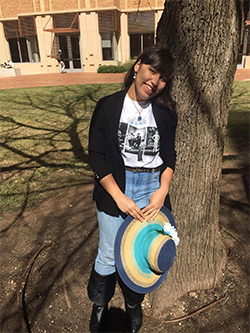
Indah Huegele
Ph.D. in Biology, 2023
Department of Biology
Florida Museum of Natural History
Advisor: Dr. Steven R. Manchester
Email: indah.huegele”@”ufl.edu
I’m currently working with Dr. Steven Manchester on a project regarding the floristic diversity of the Oligocene Catahoula Formation in Texas, though I plan to initiate a larger phylogenetic project over a yet-to-be-decided-upon angiosperm lineage for my dissertation. I received my Bachelor of Science degree in Geology with a minor in Biology from the University of Texas at Austin, wherein I conducted research on a species of traversodontid eucynodont Exaeretodon argentinus using CT data to study its ontogeny and dentition. I am very interested in morphological evolution (especially as is reflected through phylogeny), and have an endearing love for collections.
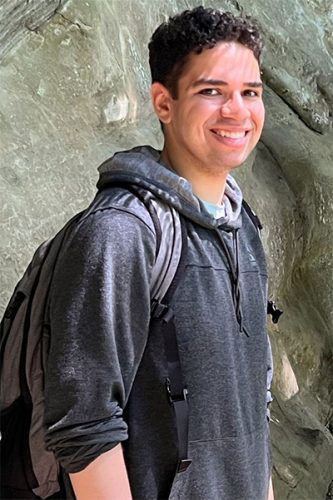
Francisco Nares
Ph.D. Student
Department of Biology
Florida Museum of Natural History
Advisor: Dr. Steven R. Manchester
Email: fnares”@”ufl.edu
I received my B.S. in Geology with a minor in Classical Studies from the University of Washington in Seattle. In Dr. Caroline Strömberg’s lab, I studied plant communities of the Miocene Pacific Northwest and how their morphological characteristics can be used to shed new light on the Miocene Climatic Optimum, the most recent major warming event prior to modern warming.
I’m now working with Dr. Steven Manchester to study the older but bigger warming periods of the Eocene. I am currently working on a project involving extinct flora found at the John Day Gulch, a macrofossil site in Oregon that likely preserves plants just after the Middle Eocene Climatic Optimum. I am interested in seeing what our paleobotanical collections can tell us about how plant morphology and distributions are impacted across this ancient warming period. Through this, I hope to find parallels to today’s changing climate and improve our understanding of how modern ecosystems will respond.
Julian Correa Narvaez
PhD Track Student
Department of Biology
Florida Museum of Natural History
Advisor: Dr. Steven Manchester
Email: j.correanarvaez”@”ufl.edu
I’m currently working with Dr. Steven Manchester on the Eocene material from the Kisinger Lakes flora of Wyoming. The project, my thesis, aims to re-evaluate the flora, which has not been re-examined since 1974; I aim to bring them up to modern taxonomy and, if necessary, use newer technology (CT-Scanning) to reveal more trait details that would update our understanding of this flora. I also aim to use the leaves’ traits to update the Kisinger lake paleoenvironmental interpretations using CLAMP, LMA and other analyses; this part of the project involves a community science approach using high school students to help broaden the datasets and to give them a real hands-on experience into science. I’m also participating in two phylogenetic projects: one adding a fossil and morphological aspect to a broad (molecular) review of the Fagales; the other in a smaller project of a fossil taxa’s features in the Sapindales. I’m interested in understanding the evolution of our planet through time – both in biological and geological aspects.
I received my B.S. and M.S. in Geology from Texas A&M University. I worked on fossils preserved in Coal Balls from the Carboniferous period, early pre-gymnosperm taxa, under Dr. Anne Raymond. I also worked on phylogenetic analyses using morphological datasets.
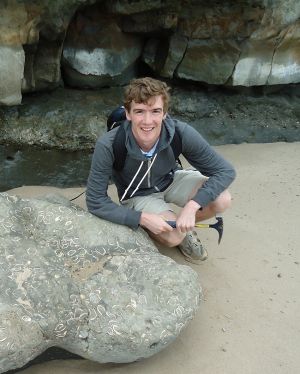
MacKenzie Smith
Ph.D. in Biology, 2023
Department of Biology
Florida Museum of Natural History
Advisor: Dr. Steven Manchester
Email: mackenziesmith”@”ufl.edu
I got my BS in Zoology and minor in Geology from Oregon State University. There I helped describe a new species of Cretaceous Osmundaceous fern from British Columbia along with Drs. Gar Rothwell and Ruth Stockey.
For my thesis I am working on describing the flora preserved in lake sediments from new localities of the Eocene Clarno Formation of Central Oregon. One of my goals is to try to figure out the paleoelevation for the sites and date them in order to make accurate comparisons with other floras. By making these comparisons, we can hopefully have a better understanding of climate change during this time and know more about the biogeography of the plants at these sites.
My other research at UF looks at the paleobiogeography of butternuts and at paleontological outreach under FOSSIL (Fostering Opportunities for Synergetic STEM with Informal Learners) – https://www.myfossil.org.
Volunteers
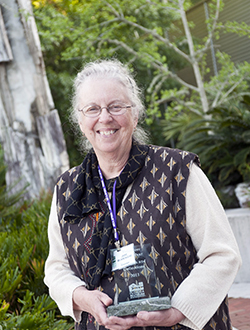
Jane Blanchard
Jane has been volunteering at the McGuire Center’s butterfly collection and the Paleobotany and Palynology division in Dickinson Hall since December 6, 2007.
Jane has been helping to curate the McGuire Center’s Neotropical (North and South America) butterfly collection since January 2008, and since then has made an extraordinary contribution. Jane has been helping to merge the collections together into a single, well-curated and labeled collection
At the same time, Jane also serves at the Paleobotany and Palynology division in Dickinson Hall, utilizing her strong botany background and experiences in research labs to help curate the fossil plant collection. With Jane’s help, two monographs documenting the flowering plant diversity based on fossil flowers, fruits, and seeds preserved in rocks collected from localities from northern Mississippi and western Tennessee have been published, and three projects are in progress.
In 2011, Jane won the James Pope Cheney Volunteer of the Year Award, presented annually to recognize the Florida Museum of Natural History volunteers who have demonstrated exceptional interest in the collections of the Museum, sincere and extraordinary interest in the educational advancement of children; and enthusiastic support for our community of volunteers.